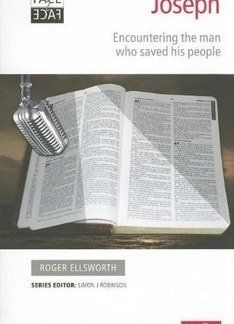Joseph – Encountering the man who saved his people
Roger Ellsworth
Day One Publications
112 pages, £5.00
ISBN: 978-1-84625-293-8
Star Rating: 3
Many preachers, such as Martin Lloyd-Jones, have rightly made 1 Corinthians 2:2 (‘I am determined not to know anything among you except Jesus Christ and him crucified’) a fundamental guiding principle for their ministry. In an article in the January 2012 edition of ET entitled ‘Christianity or i-anity’, Roger Ellsworth emphasises the importance of a Christ-centred Christianity rather than the empty i-centred remains when Christ is removed. As he says in that article ‘Christianity…rightly sees Christ as the subject of the whole Bible (Luke 24:27,44)’. It is this emphasis that he brings to his book ‘Joseph: Encountering the man who saved his people’. His aim is to reverse a perceived trend that treats Bible characters as examples of people who had problems that they successfully overcame, but does so in a way that is divorced from this context (i.e. redemption through Christ).
Apart from an emphasis on God’s plan of redemption through Christ, also emphasised is God’s sovereign plan for Joseph and his family, and his faithfulness in fulfilling his promises. This emphasis, so that ‘Joseph plainly shows us that the plans of the sovereign God do not fail’ provides comfort for his people through difficult and turbulent times.
This helpful and warm-hearted pastoral message is delivered in a highly readable book. The book itself is short, and so are the chapters, so that each can be easily read at a single sitting. Also provided are thought-provoking questions at the end of each chapter under the headings ‘For Further Study’ and ‘To Think About and Discuss’. The former explore the themes of the chapter more widely throughout the Bible. The latter emphasise personal application of the lessons drawn from the passage. The result is that the individual reader is stimulated to ‘chew the cud’ to get maximum spiritual nutritional benefit, and the book may also provide a good basis for group study.
A short book such as this, with its emphasis on application, contrasts sharply with a commentary. There are occasions when this reviewer feels that the author has adopted a particular view on a secondary matter which isn’t necessarily justified by the text. Here a good commentary (such as Currid’s, published by Evangelical Press), being careful to provide precise exegesis of the passage, with discussion of the merits of different interpretations, would be helpful. Nevertheless this is an excellent short book on the life of Joseph.
Nick Barnes,
Reading



